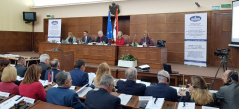The National Assembly hosted the 15th Conference of the Parliamentary Committees on European Integration/Affairs of the States Participating in the Stabilisation and Association Process in South East Europe (COSAP) today, organized by the European Integration Committee.
The Conference was opened by National Assembly Deputy Speaker Veroljub Arsic on behalf of the host, who said he was very pleased that the Serbian Parliament is the organizer of this regional meeting, which is an excellent example of best practice and testament that we can work together. He said that regional cooperation remains Serbia’s foreign policy priority, as does strengthening relations with the neighbouring countries. Arsic added that EU enlargement is vital for the countries in the region both in terms of their reform processes and fulfilment of obligations.
“We expect the European Commission’s reports to adequately note the progress of each country”, said Arsic.
Speaking of the Belgrade-Pristina dialogue, the National Assembly Deputy Speaker reminded the participants of COSAP of the Brussels Agreement and the fact that the Albanian side had met none of its assumed obligations, nor formed the Community of Serb Municipalities, and that it had imposed a customs tax on goods from Serbia and Bosnia and Herzegovina. He said he expected the EU as mediator to effect a revocation of the tax and added that Serbia is ready to continue the dialogue.
“The National Assembly is interested in intensifying the exchange of parliamentary practices, especially in the sphere of legislative harmonisation”, Arsic concluded.
Assistant Minister of European Integration Ksenija Milenkovic said that meetings such as this one strive to promote parliamentary cooperation in the region and strengthen the role of the European integration committees.
“This format provides a good opportunity to exchange experiences relating to European integration, especially legislative harmonization with the EU acquis, which is the most important pre-accession process for our countries”, said Milenkovic.
She reminded the attending of the important role the European integration committees and the national parliaments play at this moment when even the national parliaments of EU member states take active part in European affairs and emphasized how important mutual cooperation is for giving a regional voice to the issue of EU enlargement. Milenkovic added that the EU is about to enter an interesting period due to the elections for the European Parliament, stressing that she expected the enlargement policy to loom large on the list of EU priorities regardless of the outcome of the election and the composition of the new European Commission.
“The decisions made in this period are very important and we expect the EU would send a positive message to the region and that the enlargement dynamics would not be jeopardized”, said Milenkovic.
Speaking of the importance of regional cooperation, the Assistant Minister of European Integration said that exchange of experiences has proven vital both for the internal reforms and the relations with the EU.
Gabriela Crețu, Chairwoman of the Romanian Senate’s European Affairs Committee and COSAP co-chair, also addressed the participants of the Conference, telling them that her country had great expectations, as well as fears, for its Presidency of the EU Council, and thought about the future of the EU, one with the Western Balkans as an integral part. That is why Romania decided to continue with the previous presidential policy and priorities, she said, adding that the coming summit in May would concentrate on the future of the EU and the enlargement policy as one of the most successful EU policies. She added that the Romanian presidency supports EU enlargement and opined that the EU is still one big society we can all live in together.
Mateja Norcic Stamcar, Deputy Head of the Delegation of the European Union to the Republic of Serbia, said that the enlargement process and the region remain on the EU agenda, stressing the role of regional cooperation and the important role the parliaments play in the whole accession process. She stressed that the EU is interested in the accession of the Western Balkans, adding that all the partners in the region had progressed, albeit following different dynamics and intensity, with Serbia and Montenegro taking up the lead.
“EU enlargement in the Western Balkans is now more important than ever and it is in the EU’s best interest to achieve stability, because when we invest into the stability in the Western Balkans we invest into the stability in the EU itself”, Norcic Stamcar concluded.
She reminded the attending of the criteria and obligations of the accession process and the fact that there are no shortcuts to the EU. Regional cooperation is key for the stabilization and association process, said the Deputy Head of the EU Delegation adding that the region needs to work on promoting good-neighbourly relations and all outstanding bilateral issues have to be resolved before the accession.
“The EU and all of its member states have urged Kosovo to revoke the customs tax and go back to dialogue because there is no alternative to dialogue”, said Norcic Stamcar.
She also spoke about the importance of the Berlin Process, saying that though it is a good example of regional cooperation, it is not a replacement for European integration process. The biggest responsibility for the reforms and meeting of criteria lies with the region and the EU would continue with its political and financial assistance to the Western Balkans.
The Conference is attended by over 40 participants from Serbia, Albania, Bosnia and Herzegovina, North Macedonia, Montenegro, Bulgaria and Romania, who will exchange experiences and views on the importance of the interparliamentary and regional cooperation for the acceleration of reforms in the process of accession to the European Union and on the cooperation of parliaments with the civil society in the European Integration process, in two panels moderated by European Integration Committee Chairman Nenad Canak and European Integration Committee Deputy Chairperson Elvira Kovacs.





